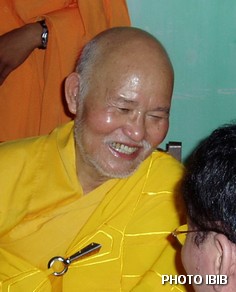 |
PARIS, 18.7.2013 (IBIB) – The Patriarch of the Unified Buddhist Church of Vietnam (UBCV) Thich Quang Do has written to the United States’ President Barack Obama, calling on him to raise issues of democracy and human rights in his coming meeting with Vietnamese President Truong Tan Sang on 25 July in Washington DC.
The UBCV leader called on President Obama to “use this opportunity to press the Vietnamese President to move forward towards a goal that Vietnamese people long for with all their hearts and minds – the transition from a one-Party state to a democracy, with guarantees of human rights, freedom and the rule of law”. The letter, dated 14 July, was sent from the Thanh Minh Zen Monastery in Ho Chi Minh City (Saigon) where he is under de facto house arrest.
In his letter, Thich Quang Do, 85, prominent dissident and 2013 Nobel Peace Prize nominee, regretted that the Vietnamese authorities had paid no heed to the demands of the UBCV and the Vietnamese people to liberalize its political system when it opened its economy under the policy of “doi moi”. “On the contrary”, he wrote, “they systematically stifled all voices calling for political reform. As a result, Vietnam’s prisons today are full of young dissidents, bloggers, journalists and human rights defenders whose only “crime” is to call for a vibrant, pluralist society which could harness the vast human resources of our dynamic population and enable them to develop their diverse talents and skills”.
Vietnam’s policy of “economic liberalization without the safeguards of free trade unions, a free press and an independent judiciary has led to endemic corruption, power abuse, a rocketing poverty gap and grave social injustices”, he said. “Whilst the ruling elite and their families enjoy a lifestyle fit for kings, ordinary workers and rural people struggle each day to survive. Vietnam has become a paradise for corrupt political cadres and “red capitalists”, and a living hell for honest people who simply seek basic food, education and health care for their children”.
The crux of the problem, stressed Thich Quang Do, is that “Hanoi’s leaders cling desperately to the one-Party system in order to preserve their privileges. But in doing so, they sacrifice the interests of Vietnam’s 90 million-strong population and jeopardize its future”. The only solution for Vietnam is democracy, he wrote. “Only with democratic institutions, a multiparty system, human rights, and the rule of law can we guarantee stable development and preserve our country’s territorial integrity. Democratic countries also make good neighbours. A democratic Vietnam would be a crucial factor of peace and stability in the Asia-Pacific region, and a reliable political partner for the United States”.
In the meeting next week, Thich Quang Do urged President Obama to “press the Vietnamese leader to urgently engage in a process of political reforms. Peaceful democratic transition can save our people from so much suffering, and it is the only way to ensure a bright and promising future for Vietnam”. The UBCV leader also emphasized “the importance of religious freedom in this democratic process, for Vietnam’s religious movements are the voices of independent civil society, and have continued to raise the people’s grievances under the communist regime for the past thirty eight years”.
Thich Quang Do said he spoke as one who had “suffered government persecution first-hand”, and remains under house arrest without charge at the Thanh Minh Zen Monastery in Ho Chi Minh City (Saigon), where US Ambassador David Shear visited him last year. Despite government repression, however, “as a Buddhist monk and leader of the UBCV, I believe it is my duty to speak out”.
“The UBCV, which is effectively banned and has been repressed by the Vietnamese government since 1975, has never ceased its nonviolent combat for social justice”. This does not mean that the UBCV is being “political”, as the authorities often claim, said Thich Quang Do. Advocating democracy is simply “the expression of a 2,000-year spiritual engagement of Vietnamese Buddhists, inspired by compassion and tolerance, to defend our people against injustice and oppression. Buddhism is a philosophy of peace, but just as our ancestors opposed feudalism and obscurantist policies in the past, we engage for human rights and democratic freedoms today”.
Thich Quang Do urged the U.S. President to raise these urgent concerns with President Truong Tan Sang, and “speak out on behalf of the millions of Vietnamese who have no voice in their own country today”.
 Quê Me Quê Me: Action for democracy in Vietnam & Vietnam Committee on Human Rights
Quê Me Quê Me: Action for democracy in Vietnam & Vietnam Committee on Human Rights



